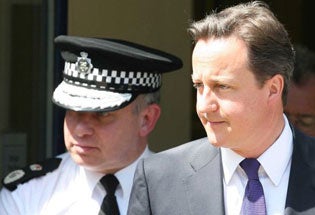Cameron hails 'incredible tales of bravery'

Prime Minister David Cameron visited Cumbria today and described local people coping with the aftermath of Derrick Bird's shooting rampage as "incredibly brave".
Mr Cameron and Home Secretary Theresa May visited West Cumberland Hospital and then Workington police station to meet survivors and their families and pay tribute to staff who were working that day.
"Obviously, people here in west Cumbria have suffered the most appalling tragedy and it will have a huge impact on the community," he said.
"And I wanted to come here to show (that) the Government wanted to listen, wanted to show how much it cares about what has happened here.
"People - I have met some of them - are having to come to terms with the most appalling random acts that they will find very difficult to understand and in some cases there will be no proper explanation."
Mr Cameron, speaking from Workington police station, said it was too early to jump to conclusions as to what may have caused Bird to shoot 12 people dead before turning the gun on himself.
"What we don't know yet is all the facts in the case," he said.
"I've had a presentation from the police about what they know so far and there is more to be learned and more to be understood.
"There will be some parts of this that we will never understand. There were some random acts of killings and people who will have lost loved ones will ask why it happened to them and why so random; why it is so unfair and so cruel what's happened here.
"You will hear incredible tales of bravery. I met a woman at the hospital who lost her neighbours, incredibly brave. She wants to go home and start to rebuild her life.
"There are incredible stories of bravery here and an amazing community that has been torn by this but will eventually come through this like other communities have.
"I think we should give them the time to mourn those that they have lost and I think it is very important that the media understand that too.
"To respect the wishes of the community in terms of giving them time and the space that they need to understand what has happened to all of those that were lost.
"And then, yes, to ask all the questions that they will have.
"Inevitably, people will have questions and the Government needs to be here to listen, to show them that it cares and also to try and find the right way to answer the questions that people quite legitimately have about these dreadful events that have happened."
During Mr Cameron and Mrs May's private visit to the Whitehaven hospital - where five victims are being treated - they met some of Bird's victims.
Some of the 11 survivors suffered terrible facial injuries as the killer appeared to deliberately aim for their heads.
At Workington police station the Prime Minister and Home Secretary were briefed by senior officers, including Cumbria Chief Constable Craig Mackey, on developments in the wide-ranging investigation.
Mr Cameron then met some of those who were first on the scenes of the killings on Wednesday, including ambulance workers, police officers, firefighters and mountain rescue teams.
Two of the armed officers, who were among the first to arrive in Whitehaven after Darren Rewcastle was shot dead, told the Prime Minister how they had tried to follow Bird as he sped across the Cumbria countryside, shooting people at random.
One of the officers said: "It was so fast. It was unbelievable. We were no more than 36 minutes behind him.
"We kept coming across where he had been. There were just too many roads and too many options to go down."
Mr Mackey, who was accompanying Mr Cameron, explained there was 225 square kilometres of countryside in the county, which made it difficult to follow Bird.
Meeting members of the Civil Nuclear Police, who guard Britain's nuclear sites, including Sellafield, Mr Cameron told them: "Thank you for what you've done in these incredibly tough 48 hours. I just wanted to come here and thank you for what you have done."
The Prime Minister also spoke with civilian staff who work in the police's communications control room, answering calls from members of the public.
He told them: "I just wanted to come and thank you for what you did. It is something we cannot explain."
Before leaving the police station, Mr Cameron answered questions from reporters and praised the emergency services and the police for all they did.
"As people's sadness and mourning will give way to a sense of numbness, then there will be lots of questions that people want to ask," he said.
"We have to make sure that we find the right way to answer those questions and helping this community through what is to be a very, very difficult time."
Mr Cameron was asked whether there was now an urgency to tighten gun laws.
"I think the Government must look at all of the issues and, of course, gun issues is something that has to be looked at," he said.
"We do have very tough gun control in this country and I think what we need to do is take the time to allow people through that phase of mourning and realising and understanding, the incredible sense of loss that people have in Cumbria, not leaping to conclusions.
"But yes, lots of questions that we will have to ask and we have to make sure that we answer those questions and do everything we can to help them through that process."
Join our commenting forum
Join thought-provoking conversations, follow other Independent readers and see their replies
Comments
Bookmark popover
Removed from bookmarks